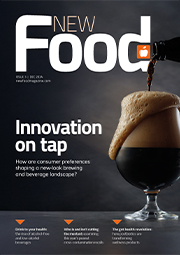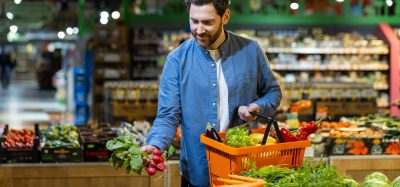Brexit: five key priorities the food and drink industry should champion
- Like
- Digg
- Del
- Tumblr
- VKontakte
- Buffer
- Love This
- Odnoklassniki
- Meneame
- Blogger
- Amazon
- Yahoo Mail
- Gmail
- AOL
- Newsvine
- HackerNews
- Evernote
- MySpace
- Mail.ru
- Viadeo
- Line
- Comments
- Yummly
- SMS
- Viber
- Telegram
- Subscribe
- Skype
- Facebook Messenger
- Kakao
- LiveJournal
- Yammer
- Edgar
- Fintel
- Mix
- Instapaper
- Copy Link
Posted: 12 September 2018 | James Smith | No comments yet
James Smith of the UK Flavour Association shares his thoughts on what direction the food industry should be taking…


Uncertainty presents the biggest immediate challenge, with parts of the industry essentially ‘in limbo’, as evidenced by big UK firms and those with an overseas focus cutting back on investment, and a significant decrease in foreign direct investment in the UK in 2017 (according to the Organisation for Economic Co-operation and Development (OECD)). However, some food and drink manufacturers are actually increasing investment in areas such as automation technology, in an attempt to offset a possible squeeze in the labour market.
As an industry, we fear many of the potential consequences of Brexit and feel justified in voicing them with our representatives. However, there are also opportunities that come with this monumental change and it is only sensible to consider them. Membership of industry associations such as the UK Flavour Association is more important than ever, to provide a common voice and enable us to lobby and influence decisions that affect us all. Here, we discuss some of the key challenges of Brexit and how, if overcome, they could lead to mutual success for both the UK and the EU.
1 European Food Safety Authority (EFSA) and EU regulations
40 per cent of all European legislation relates to food and agriculture, and 80 per cent of all UK food legislation has been negotiated in the EU. There are approximately 4,500 EU regulations covering food, farming and environmental standards and deciding which to adopt, amend, or abolish should be driven by the industry. We – the members of the UK Flavour Association – believe that it would benefit the UK to remain aligned with EU regulation. Most food manufacturers support the UK continuing its membership with EFSA post-Brexit,3 which will ensure that safety, quality and authenticity standards are unified. This could give rise to a UK food and drink industry that adheres to the strict safety and quality standards of the EU, while giving UK producers more flexibility beyond safety and quality within the domestic market. It is important that the UK remains part of high-level initiatives, such as global emissions reductions, environmental controls and cross-border operations in the future, as it will benefit both the UK and the EU.
Intellectual property (IP) protection in the face of Brexit is a cause for concern for many food and drink manufacturers, but it needn’t be. UK national IP rights will not be affected by Brexit and EU-registered trademarks (which currently cover the UK) will remain until new provisions are put in place. Articles 50-57, published in March 2018, state that the UK will stay part of the EU design and trade mark systems until the end of the transition period (31st December 2020). After this time, UK registrations will be automatically created from EU registrations.
2 Workforce requirements
According to the Food and Drink Federation (FDF), the UK will need 130,000 new recruits by 2024 to feed an expected population of 70 million and meet market demands.4 The food and drink sector directly employs 400,000 people nationwide, approximately 27 per cent of whom are non-UK EU nationals. Ending freedom of movement will almost certainly impact the labour market, with visa and permits likely to add cost and complication that could harm the industry, as well as dissuading EU migrants – both skilled and unskilled – from seeking work in the UK.
As well as business owners needing reassurance, EU nationals working in the UK need confirmation that they will be allowed to remain. In the short term, the UK food and drink sector must continue to have immediate access to the skills it needs, but in the longer term, it must reassess how best to meet its skills gap and ensure UK nationals are attracted to careers in the sector. It should also take the opportunity to reform, where necessary, its working conditions and wages – especially in relation to unskilled work – so the industry can lead the way in corporate responsibility. The FDF is taking steps to close the UK skills gap, by driving graduate programmes and apprenticeships especially for skilled food engineers and scientists.
3 Customs agreements
The intricacies of Brexit negotiations can be difficult to digest. However, it’s quite clear that the success of the UK food and drink sector has, until now, been dependent upon involvement in the Single Market and Customs Union. The UK’s reliance on the EU as its key trading partner, facilitated by the free movement of people and goods, means that a so-called ‘hard Brexit’ could seriously hinder the export efforts of UK businesses.
According to the Business, Energy and Industrial Strategy (BEIS) Committee, the negotiation of a free trade agreement with the EU should be the number one priority for the government and it seems that the Prime Minister has taken heed of this, proposing a new free trade area in the July whitepaper. If no agreement is made before the transition period ends, then trade between the UK and EU would revert to World Trade Organization (WTO) rules. The sector would undeniably suffer from reverting to WTO tariffs in the event of a ‘no deal’ scenario, but there have been suggestions that this could offer a unique opportunity to abolish tariffs on EU and non-EU imports to facilitate trade.
The increased number of non-tariff barriers (trade barriers that restrict imports and can include policy measures, quotas and levies), as a result of leaving the EU, is predicted to have a seriously detrimental impact on the food and drink sector –increasing costs by 17 per cent in tariff equivalent.4 Non-tariff barriers, in the form of border delays and increased bureaucracy, will have an adverse impact on UK competitiveness. Diageo – an international producer of spirits and beer – told the BEIS Committee that a 15-minute wait for each truck at the border between Ireland and the UK would cost £1.3 million per year to Diageo alone – and potentially more for its suppliers.
There is potential for further delays at borders if certificates of origin for all products exported to the EU are challenged, even under a free-trade agreement. The rules determine if a foodstuff qualifies for preferential tariff rates, dependent on the origin of the primary ingredient of the food and/or the value-added production that the ingredients have been subject to. The nature of the flavourings industry, with many raw ingredients globally sourced, leaves it vulnerable to not qualify for preferential tariffs, resulting in an effective ‘hard’ Brexit for such goods.
The European Commission’s ‘Trade for All Strategy’ suggests that 90 per cent of global economic growth in the next two decades will come from outside the EU,5 so the establishment of trade agreements with non-EU countries is arguably even more important. However, this may not be possible until the rest of the world understands how the UK’s new relationship with the EU will work, so getting that right must remain the priority.
4 Subsidies
The Common Agricultural Policy (CAP) is the EU’s agricultural policy, which implements a system of agricultural subsidies and support programmes, combining direct payments to farmers with support to rural development programmes. For UK farming, 55 per cent of the total income comes from CAP support6 and the farming sector has benefitted from direct EU payments of over £2 billion, paid per hectare, and about £600 million in rural development payments in 2016 via the CAP.7 The aim of this policy is to provide affordable food to EU citizens and establish a fair standard of living for farmers.
The government has committed to protecting subsidies until 2022, but the food and drink supply chain requires an indication of how the UK intends to replace the subsidies currently provided to UK farming. The government also needs to clarify what will happen to companies whose research and development (R&D) efforts use long-term EU innovation grants. Michael Gove, Environment, Food and Rural Affairs secretary, said the government’s approach to farming after 2022 will emphasise conservation and the environment, with new subsidies directed at farmers who, “enhance the natural environment”, such as by planting woodland or creating new wildlife habitats.
Some people believe that Brexit may present an opportunity to liberalise a heavily regulated part of the economy, but that a diverse and vigorous new rural economy is unlikely to appear overnight. Some subsidies should be maintained to allow the sector to evolve sustainably, but considering that there is currently no policy to replace the CAP and any future policy is unlikely to reach the scale of support that the CAP offers, farmers and the food and drink industry are becoming increasingly concerned.
5 Research & Development
The UK is a world leader in food and beverage R&D, with both private and public funding coming from the UK and EU. It also benefits from collaborative EU programmes, so maintaining this and establishing future participation would be hugely important. More than half the UK food and drink manufacturers surveyed by BDO LLP for its annual Food & Drink Report8 said they are turning to new product development to keep up with industry trends and boost sales. R&D institutions will require continued access to funding and skilled researchers from around the world in order to support innovation, and R&D tax incentives in the food and drink industry could soften the blow of reduced access to skilled workers from the EU. Additionally, expansion of the Annual Investment Allowance to bring forward spending on productivity-enhancing modern machinery will support growth, as will an extension to Innovate UK’s R&D budget.
Final thoughts
The greatest difficulty currently facing UK food and drink businesses is uncertainty. The resignations in July 2018 of key cabinet members Boris Johnson and David Davis has shaken the UK’s trust in the ability of the government to agree amongst themselves, let alone with the EU, on the best and most realistic Brexit deal for both sides.
While there are several challenges that cause concern across the food and drink supply chain – such as reduced subsidies for farmers, the potential impact of a no-deal on trade, and a possibly diminished workforce –opportunities also exist for the UK and EU to maintain strong ties and lead the world in food and beverage quality and safety standards, innovation and productivity.
Although it is impossible to predict the outcome of the final negotiations, the new Whitepaper published in July indicates that the Prime Minister is trying to adopt a pro-business agenda, which, if she is able to press ahead with unhindered at home, provides cause for cautious optimism. The coming months are certainly crucial for all of us.
For more information on the impact of Brexit on the food and drink industry, please visit http://www.ukflavourassociation.org/about-us/our-link-with-europe.
About the author
James Smith is Chair of the UK Flavour Association and leads its Executive Committee in key discussions regarding the flavourings industry as it works to promote and protect the interest of its members. James is also Managing Director of Kalsec Europe Ltd, a position he has held since 2015.
The rest of this content is restricted - login or subscribe free to access


Why subscribe? Join our growing community of thousands of industry professionals and gain access to:
- bi-monthly issues in print and/or digital format
- case studies, whitepapers, webinars and industry-leading content
- breaking news and features
- our extensive online archive of thousands of articles and years of past issues
- ...And it's all free!
Click here to Subscribe today Login here








